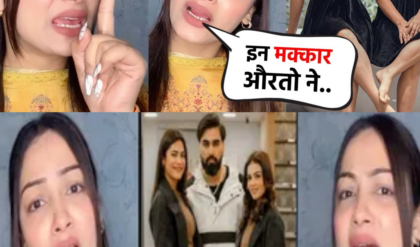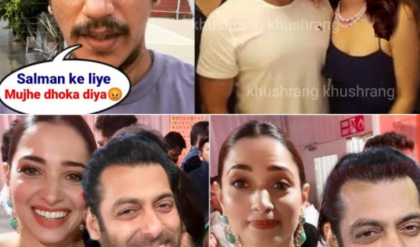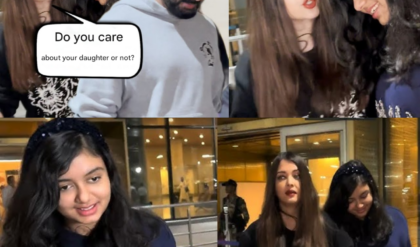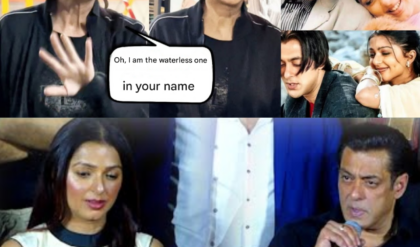The NBA has found itself shrouded by claims of nepotism in the last month after Bronny James, the eldest son of the league’s all-time leading scorer LeBron James, was drafted by the Los Angeles Lakers.
James Jr was selected with the 55th overall pick in the draft, historically not a game-changing draft slot, and has since signed a four-year, $7.9 million contract with the Lakers. In comparison, the Lakers’ other pick from the 2024 draft, Dalton Knecht, signed a four-year, $18.4 million deal after being taken in the first round (No.17 overall).
The James duo are slated to be the first father-son teammates in NBA history, provided junior is ready to handle NBA minutes in his rookie season. Whether he is ready to take that step up remains to be seen.
James turned out in the summer league for the Lakers and although his on-court production proved to be well and truly a mixed bag, his presence brought an undoubted buzz to Las Vegas where the tournament took place.
While the story of a father and son potentially playing together for the first time in league history seems to be objectively awesome on the surface, the James family reunion on the Lakers has also left many onlookers feeling incredibly uncomfortable.
Here is a look at what has been an interesting first month in Bronny James’s NBA career.
Why has James’s selection caused so much controversy?
To put it simply, the way the James camp engineered James Jr’s move to the Lakers left a sour taste in a lot of fans’ mouths.
James surprised many draft experts by throwing his hat in the ring for this year’s draft after an extremely underwhelming debut season in the college system with the University of Southern California (USC).
The 19-year-old started just six times en-route to averaging 4.8 points, 2.8 rebounds and 2.1 assists per game in 25 appearances. James shot 36.6 per cent from the field and 26.7 per cent from three-point range in 19.3 minutes per contest.
Those are the kind of numbers that would cause almost any other draft prospect to go back to college in a bid to improve their draft stock, but James isn’t any other draft prospect.
James declaring he would enter the draft indicated he likely had a promise from his father’s team to get selected.
There’s important context that needs to come with those college stats. After coming into his college season as a four-star recruit out of high school, James collapsed during a USC practice session.
It was eventually revealed that James collapsed after suffering a cardiac arrest due to a congenital heart defect. ESPN draft expert Jonathan Givony had James ranked as a top-10 draft prospect prior to his collapse.
Some of the chatter surrounding James’s ability has made it seem like he was plucked out of absolute obscurity by the Lakers, this couldn’t be further from the truth.
Prior to his college career, James was selected as a McDonald’s All-American in 2023, and looked the part in that game while sharing the court with eventual lottery selections from his draft class such as Matas Buzelis (the No.11 pick), Stephon Castle (No.4) and Reed Sheppard (No.3).
Following his hospital stay, James struggled to emulate the level of play he’d shown prior to his collapse, causing his draft stock to plummet. Before he threw his hat in the ring for the 2024 draft, most draft experts did not expect James to be one of the 60 players to be drafted.
James’ agent, Klutch Sports CEO Rich Paul, who also manages his father’s affairs, revealed prior to the draft that he’d only worked out individually for two teams — the Phoenix Suns and the Lakers.
“This is nothing new,” Paul told ESPN.
“The goal is to find a team that values your guy and try to push him to get there. It’s important to understand the context and realise that this has always been the strategy with many of my clients throughout the years, especially those in need of development like Bronny. My stuff is by design.”
As the draft unfolded last month, former Golden State Warriors general manager Bob Myers indicated that the James camp had threatened the NBA’s other 29 teams that the player would go to Australia instead if selected by them and not the Lakers.
“Right now Rich Paul is calling teams [saying] don’t take Bronny James,” Myers said on ESPN’s coverage of the NBA Draft.
“He is telling them, ‘Do not take him, if you take him, he is going to Australia’.”
The Lakers’ four-year commitment to James was also uncommon, but not unprecedented, for a player taken with the 55th pick in the draft.
For comparison’s sake, three players drafted in the 50s from the 2023 draft, Chris Livingston, Trayce Jackson-Davis and Toumani Camara all signed multi-year deals with their respective teams.
How did James fare during the NBA summer league?
Make no mistake about it, James’s summer league stats in his four games in Las Vegas don’t make for pretty reading.
James finished the summer league campaign averaging 8.8 points, 3.5 rebounds and one assist per game while shooting 35 per cent from the field and 15.8 per cent from three-point range in four Vegas appearances.
The statlines from his first two games were downright ugly. James put up eight points and five rebounds on 3-14 shooting in the Lakers’ Vegas opener against the Rockets and followed it up with two points on 1-5 shooting against the Celtics.
The lowlight of James’s summer league was undoubtedly during the Celtics game, where Boston’s newly-minted Finals MVP Jaylen Brown, who was seated courtside, was captured telling his partner, ex-WNBA player Kysre Gondrezick, “I don’t think Bronny is a pro,” with the clip going viral on social media afterwards.
Brown’s assessment seemed to be shared by many onlookers, but to the 19-year-old James’s credit, he looked unfazed by all the talk surrounding his play in the next two games.
The Celtics star responded to the viral video by throwing his support behind James’s NBA journey saying, “It’s a flex to have your son alongside you in the NBA it reflects greatness and longevity! Bronny has the tools around him to be successful I look forward to watching his growth.”
Standing at 185cm, James comes into the league undersized as a guard, and his outside shooting ability is going to be a major key to whether he can carve out a successful NBA career.
The early returns on this were not great, as James went 0-11 from long distance in the first two games, but his shot came around in the final two games.
James knocked down two three-pointers in a 12-point effort on 5-11 shooting in a one-point win over the Hawks, before putting together his most complete game in the Lakers’ summer league finale against the Cavaliers, where he had 13 points, five rebounds, three assists and two blocks on 5-10 shooting.
“He’s trying to find his way,” South Bay Lakers and summer-league coach Dane Johnson said.
Bronny James finished his Summer League campaign with a strong outing against the Cleveland Cavaliers.(Getty Images: Candice Ward)
“He’s trying to find the offence. Again, trying to get more reps with our guys to feel comfortable. But not worried about him. I’ve seen him shoot. I’ve seen him play.”
James’s lack of size means he plays positionally as a point guard, although his lack of playmaking skills means he is better suited to being a team’s secondary ball handler.
While he isn’t tall for a guard, James projects as a plus on the defensive end due to his athleticism and wing span (roughly 200cm). He displayed his athleticism at the NBA draft combine where his vertical of 40.5 inches (102.87cm) ranked fourth among all prospects at the combine. His defensive ability will be another major swing factor in whether he is able to carve out a career at the pro level.
Lakers head coach JJ Redick has urged James to be aggressive when defending opposing guards. He is most likely to crack the Lakers rotation as a defensive stopper off the bench if he gets any minutes as a rookie.
“We want him pressuring the ball,” Redick told ESPN on the Lakers-Rockets broadcast. “I told him yesterday, I said, ‘If you get blown by, if you have 10 fouls, that’s on me. I want you up pressuring the ball’.”
What has James himself said about all the chatter surrounding his play?
Much like his father, James is incredibly polished and insightful whenever he speaks to the media. If he has been fazed by all the discussion surrounding his draft selection, he certainly hasn’t shown it to this point.
James has always been mindful of carving out his own path and not simply being known as LeBron’s son, it is why he goes by his nickname Bronny, as opposed to being called LeBron.
James was also known to wear different numbers to his father’s famous No.23 while playing at the high school level, often opting for No.0. He will wear No.9 with the Lakers as a tribute to late rapper Juice WRLD instead of his father’s old No.6, which is currently unassigned.
“My dream has always just been to put my name out, make a name for myself, and of course get to the NBA, which is everyone’s angle in here,” he said prior to the draft.
“I never thought about just playing with my dad, but of course, he’s brought it up a couple times.”
There were murmurs in the lead-up to the draft that James would refuse to play any minutes in the G League, a theory that the player himself has been happy to debunk.
“I’m just looking forward to any basketball I play, no matter what level I’m playing at,” he said when directly questioned about the prospect of playing in the G League.
“Going into film and looking at the things I always do. Always focusing on playing as hard as I can on the defensive end. Just getting better every time I step on the floor.”
The coverage on social media of James was uncomfortable at times. The Summer League is known for not making even the best draft prospects look great. It’s often a messy environment filled with players trying to fill their own statsheets up in the hope of securing a contract.
Whenever James missed a shot, or found himself on the wrong end of a highlight play from an opponent, posts or graphics from NBA content aggregation pages were not too far away.
His famous father admitted the youngster’s temperament was very different to his at the same age when asked about all the negativity surrounding his son.
“I don’t know if people really understand Bronny,” he told ESPN ahead of the Paris Olympics.
“He doesn’t care. I actually cared a little bit when I came in. I wanted people to like me and some of the things that people were saying about me kind of bothered me early on in my career (and) I let it get to me.
“Bronny doesn’t give a f**k. Bronny plays, he works his tail off (and) when he’s done, he goes home and plays video games. He does not care about nobody, he doesn’t even listen to that stuff.
“He’s like the complete opposite to his dad. His dad will say something, but Bronny does not care.
“Personally, when I was coming up, I had no choice. I had to make it out for me, my mum, my family, Bronny has all the choices in the world.
“People don’t understand how hard that is, the commitment for him to come out of heart surgery less than a year ago. The kid is special.”
James Jr’s career is poised to be a test case for multiple parties involved in his selection.
If he pans out and is able to carve out a respectable career, it will be a major win for not only the player himself, but for the Lakers, who will have landed a solid player for very little in terms of draft compensation.
The Lakers move to draft LeBron’s son will be seen as a shrewd move, and the James camp’s decision to engineer his move to the Lakers will be a major win for player power. It could pave the way for other players to do the same in future drafts.
If James Jr flames out a year or two into his four-year contract, both the James camp and the Lakers will be left with egg on their faces. LeBron will be criticised for rushing his son into the league to achieve his personal dream of playing together, rather than doing what was in his son’s best interests.
The James family finding a way to get the father-son combination together on the Lakers means James Jr now has a bullseye on his back, something that is unheard of for a player selected with what is usually a throwaway pick at No.55. This is the cost of the way they did business on draft day.





